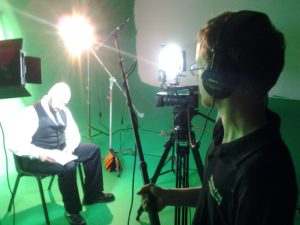There is no requirement for a Clark University student to become a LEEP (Liberal Education and Effective Practice) Project Pioneer. Since the launch of the Pioneer program last year, however, the number of students taking advantage of the opportunity to do this meaningful work and research beyond the classroom has more than doubled — from 46 to 108.
Watch Andy Doig discuss
his work at WaterFire.
LEEP Project Pioneers were all over the map this summer, from India to Siberia to the laboratories in Clark’s Lasry Center for Bioscience, working
closely with faculty and staff
mentors, alumni and outside
companies on projects that spanned
the breadth of academic and professional experience.
What did they learn in the process? How to work
collaboratively and creatively; how to seek solutions to problems, and to
accept victory and failure with equal grace; and how to apply these and other core
tenets of LEEP to authentic world and workplace situations.
Several Pioneers will be profiled in the fall issue of CLARK alumni magazine. Here, we share the story of one of those Pioneers, Natick, Mass., native and Clark English major Andy Doig ’14.
*****
Providence-based horror writer H.P. Lovecraft was the Stephen King of his time, an author whose early-20th-century horror stories took his readers to otherworldly places. He would certainly have approved of WaterFire, the performance-art mainstay staged several times each summer, which features a series of controlled bonfires lit along three downtown rivers in a music-filled ceremony blending the primal with the New Age.

Andy Doig ’14 helped bring Lovecraft back to life this summer through his LEEP project with WaterFire Providence, working with a video crew to create “augmented reality” segments that visitors could access via QR codes placed throughout Waterplace Park. The videos, filmed with actors against a green screen and later enhanced with computer effects, coincided with the NecronomiCon convention celebrating the author’s legacy, and offered a narrative of Lovecraft’s life and times.
Doig came to WaterFire with experience in audio engineering — including work at radio station WCUW and recording spoken pieces for Prof. Meredith Neuman’s “Poetry and Orality” class — and soon found himself immersed in all phases of video production. He first edited and logged previously shot tape, then filmed, edited and synced music to his original footage.
His work at WaterFire was challenging, the breadth of his responsibilities impressive. On lighting days, Doig and others set up and monitored the audio system, which runs the length of Waterplace Park. If something went wrong, he was expected to remedy the situation. In addition, he shot and edited video footage of the events “for posterity, for marketing, for entertainment,” and funneled content onto social media through blogs and tweets.
At every turn, Doig was encouraged to propose new ideas and strategies for improving the venerable show.
“I’m a longtime fan of Clark and its sense of disciplined, independent, motivated students,” said Barnaby Evans, executive director of WaterFire. “We’ve been very pleased at the capacity of the Clark students to be excited, self-directed, to raise their hands and say, ‘Hey, I’ve got an idea.’ That’s the kind of partner we love to have.” Doig was joined at WaterFire by fellow LEEP Project Pioneers Chelsea Kryspin ’14 and Casey Epstein ’14. The Pioneers’ involvement with WaterFire was made possible by alumnus, Corinne Barber ’07, M.P.A. ’08, development coordinator. Epstein interned directly under Barber.
When it comes to his future plans, Doig is already playing to his strengths. He’s filmed a pilot TV series, using the skills he honed at WaterFire, and he’s doing the sound work for two independent films. “This is where my career is headed,” he acknowledges.
Doig recalls the many times he commuted to Clark from his home in Natick, Mass., listening to NPR “horror stories” (presumably unimagined by H.P. Lovecraft) about college graduates unable to find work. He took on the LEEP project as a way to find both a creative outlet and avoid becoming an unfortunate statistic. This summer’s opportunity “let me take the skills I picked up in school and put them into a real-world context. It got my feet wet and got my motor running — it helped speed up the transition from straight college student to true professional. That’s a real advantage when you’re competing for a job against 300 other people who have just graduated.”
Visit the LEEP Project Pioneers blog page to learn other students’ summer work.
